-
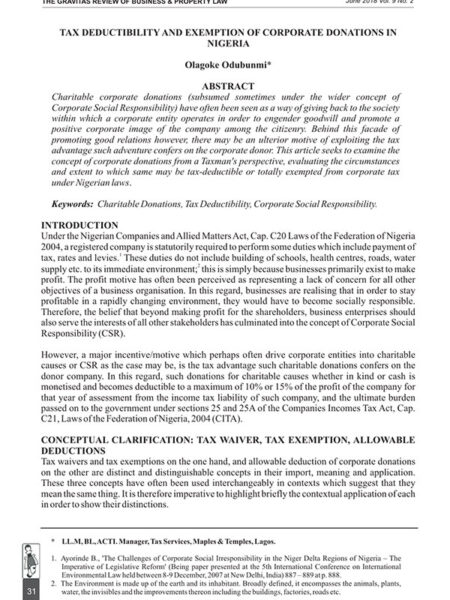
Tax Deductibility and Exemption of Corporate Donations in Nigeria
0₦2,500.00Olagoke Odubunmi, Manager, Tax Services, Maples & Temples, in his paper, Tax Deductibility and Exemption of Corporate Donations in Nigeria, notes that charitable corporate donations (subsumed sometimes under the wider concept of Corporate Social Responsibility) have often been seen as a way of giving back to the society within which a corporate entity operates in order to engender goodwill and promote a positive corporate image of the company among the citizenry. Behind this facade of promoting good relations however, there may be an ulterior motive of exploiting the tax advantage such adventure confers on the corporate donor. Odubunmi examines the legal framework for regulation of corporate donations in Nigeria. He explores the methods of making allowable and tax-deductible corporate donations, and use of charitable trusts as a vehicle for making corporate donations.
-
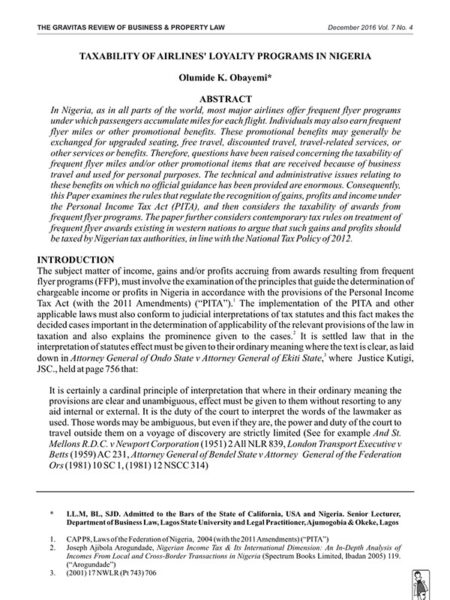
Taxability of Airlines’ Loyalty Programs in Nigeria
0₦2,500.00Dr. Olumide Obayemi, Legal Practitioner, Ajumogobia & Okeke and Senior Lecturer, Department of Business Law, Lagos State University Ojo in his article “Taxability of Airlines’ Loyalty Programs in Nigeria” examines the taxability of frequent flyer miles awards and other promotional benefits by airlines. Drawing comparison from US and Canada, he posits that airlines’ loyalty and promotional programs are “gain, profits and income” under the Personal Income Tax Act (PITA) and the beneficiaries of such programs are subject to tax on them.
-
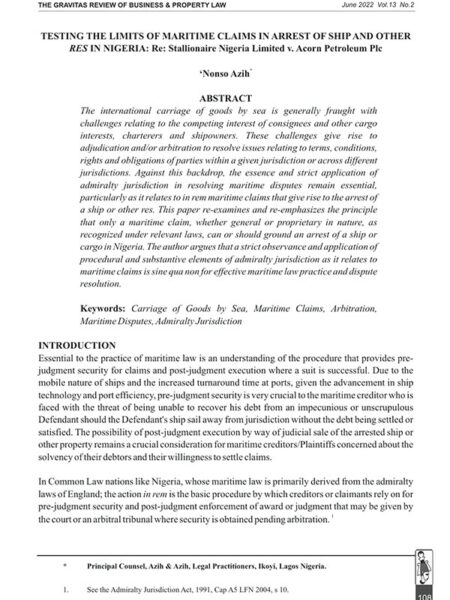
Testing the Limits of Maritime Claims in Arrest of Ship and Other Res in Nigeria: Re: Stallionaire Nigeria Limited v Acorn Petroleum Plc
0₦2,500.00Nonso Azih, Principal Counsel Azih & Azih, in his article, Testing the Limits of Maritime Claims in Arrest of Ship and Other Res in Nigeria: Re: Stallionaire Nigeria Limited v Acorn Petroleum Plc, notes that international carriage of goods by sea is generally fraught with challenges relating to the competing interest of consignees and other cargo interests, charterers and shipowners. These challenges give rise to adjudication or arbitration to resolve issues relating to parties’ terms, conditions, rights, and obligations. The essence and strict application of admiralty jurisdiction in resolving maritime disputes remain essential, particularly as it relates to in rem maritime claims that give rise to the arrest of a ship or other res. Nonso re-examines and re-emphasises the principle that only a maritime claim, whether general or proprietary in nature, as recognised under relevant laws, can or should ground an arrest of a ship or cargo in Nigeria. He argues that a strict observance and application of procedural and substantive elements of admiralty jurisdiction as it relates to maritime claims is sine qua non for effective maritime law practice and dispute resolution.
-
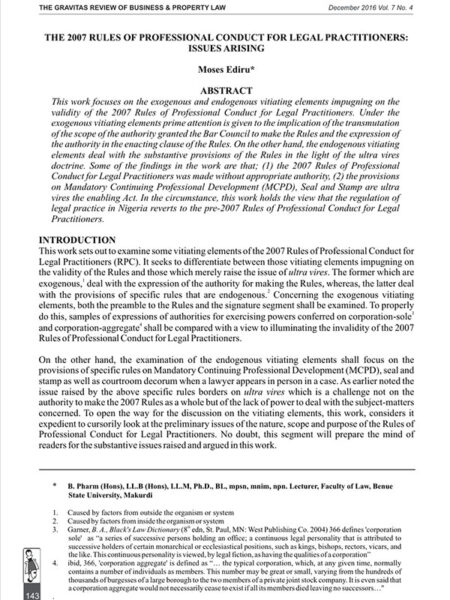
The 2007 Rules of Professional Conduct for Legal Practitioners: Issues Arising
0₦2,500.00Dr. Moses Ediru of the Faculty of Law, Benue State University, Makurdi in his compelling piece “The 2007 Rules of Professional Conduct for Legal Practitioners: Issues Arising” gives exogenous and endogenous vitiating elements impugning the validity of the 2007 Rules of Professional Conduct for Legal Practitoners (RPC). He argues that the 2007 RPC was made without appropriate authority, the provisions on Mandatory Continuing Professional Development (MCPD), Seal and Stamp are ultra vires the Legal Practitioners Act and the decision of the Supreme Court in Gen. Sarkin Yaki v Senator Abubakar Bagudu on the Seal and Stamp, was reached per incuriam.
-
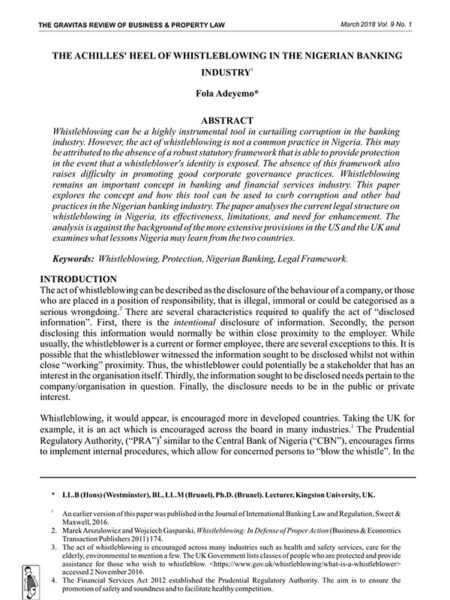
The Achilles’ Heel of Whistleblowing in the Nigerian Banking Industry
0₦2,500.00Dr. Fola Adeyemo, Lecturer, Kingston University UK in her paper, “The Achilles’ Heel of Whistleblowing in the Nigerian Banking Industry”,laments the absence of a robust statutory framework for protection of whistleblowers in Nigeria. She analyses the current legal structure on whistleblowing in Nigeria with emphasis on the banking industry. The analysis is against the background of the more extensive provisions in the US and the UK. She concludes with the lessons Nigeria can learn from the two countries.
-
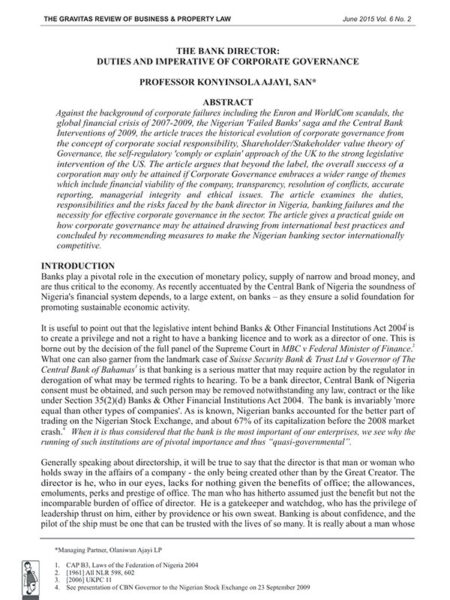
The Bank Director Duties and Imperative of Corporate Governance
0₦2,500.00Against the background of corporate failures in several countries, Professor Konyinsola Ajayi SAN, Managing Partner Olaniwun Ajayi LP, examines the duties and risks faced by the bank director in Nigeria and the necessity for effective corporate governance in the banking sector in “The Bank Director: Duties and Imperative of Corporate Governance”.
-
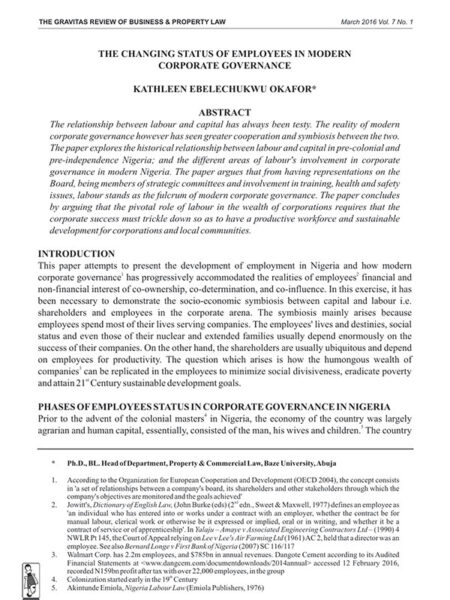
The Changing Status of Employees in Modern Corporate Governance
0₦2,500.00Dr Kathleen Okafor, Head, Department of Property & Commercial Law, Baze University, Abuja examines “The Changing Status of Employees in Modern Corporate Governance». She posits that modern corporate governance has seen greater cooperation and symbiosis between labour and capital which has accommodated the realities of employees’ financial and non-financial interest of co-ownership, co-determination, and co-influence. She explores the different areas of employees’ involvement in corporate governance and concludes that the pivotal role of labour in the wealth of corporations requires that the corporate success must trickle down for sustainable development of corporations and local communities.
-
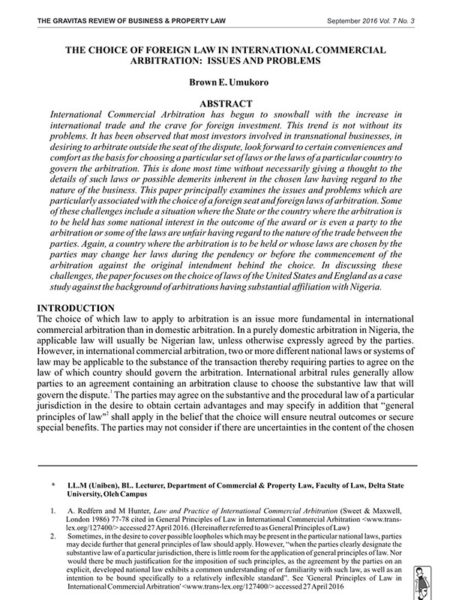
The Choice of Foreign Law in International Commercial Arbitration: Issues and Problems
0₦2,500.00Brown Umukoro, Lecturer, Faculty of Law, Delta State University, Oleh in his article “The Choice of Foreign Law in International Commercial Arbitration: Issues and Problems” examines how the expected outcome or intended benefit of a choice of foreign law in international commercial arbitration may be frustrated by several factors including law and public policy of the foreign country and change in laws during the pendency of arbitration. He concludes that the Decolonisation and Law of the Seat theories do not adequately address the concern of investors and advocates a comprehensive code of rules for the resolution of conflict between the lex arbitri and other systems of law.
-
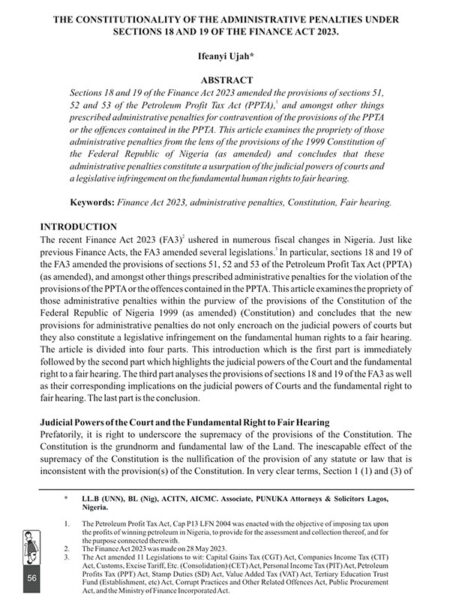
The Constitutionality of the Administrative Penalties Under Sections 18 and 19 of the Finance Act 2023
0₦2,500.00Ifeanyi Ujah, in his article The Constitutionality of the Administrative Penalties Under Sections 18 and 19 of the Finance Act 2023, examines the constitutionality of Sections 18 and 19 of the Finance Act 2023 which amended Sections 51, 52 and 53 of the Petroleum Profit Tax Act (PPTA). The article examines the propriety of those administrative penalties introduced by the amendment against the background of the 1999 Constitution of the Federal Republic of Nigeria. It concludes that these administrative penalties constitute a usurpation of the judicial powers of courts and a legislative infringement on the fundamental human rights to fair hearing.
-
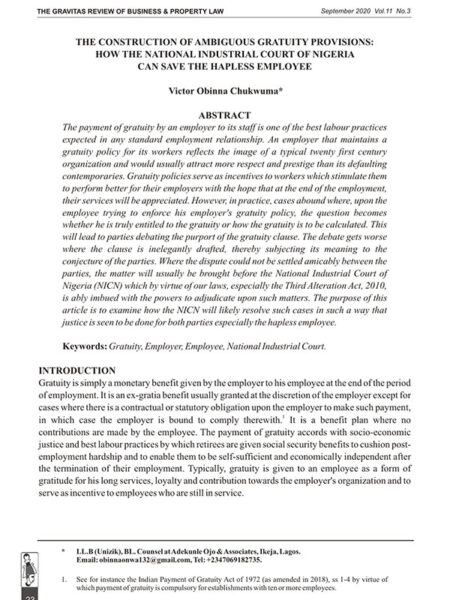
The Construction of Ambiguous Gratuity Provisions: How the National Industrial Court of Nigeria Can Save the Hapless Employee
0₦2,500.00Victor Chukwuma of Adekunle Ojo & Associates Lagos Nigeria, in his article, The Construction of Ambiguous Gratuity Provisions: How the National Industrial Court of Nigeria Can Save the Hapless Employee, examines the concept of Gratuity under Nigerian law. Chukwuma considers cases where the gratuity clause in the employment contract was in dispute and suggest mechanisms that may guide the National Industrial Court in resolving ambiguous gratuity clauses in employment contracts.
-
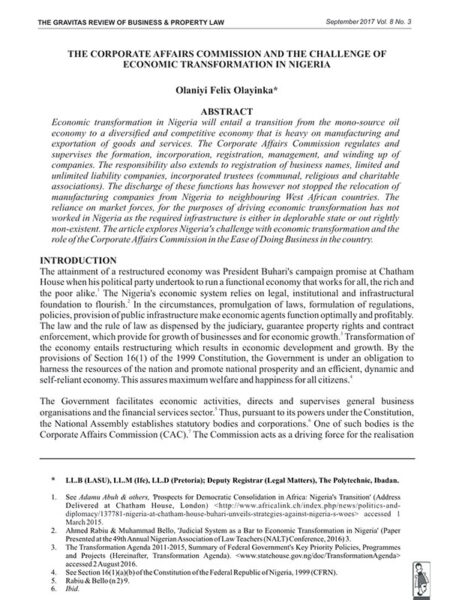
The Corporate Affairs Commission and the Challenge of Economic Transformation in Nigeria
0₦2,500.00Dr. Olaniyi Olayinka, Deputy Registrar (Legal Matters), The Polytechnic, Ibadan in his article, “The Corporate Affairs Commission and the Challenge of Economic Transformation in Nigeria” explores Nigeria’s efforts at economic transformation and the role of the Corporate Affairs Commission in the Ease of Doing Business in the country. He examines the philosophy, legal basis and challenge of economic transformation in the country. He concludes that the CAC has fared badly in leading the private sector to transform the economy because its ability is circuitously dependent on the strength of the nation’s economy which is ‘under the weather’.
-
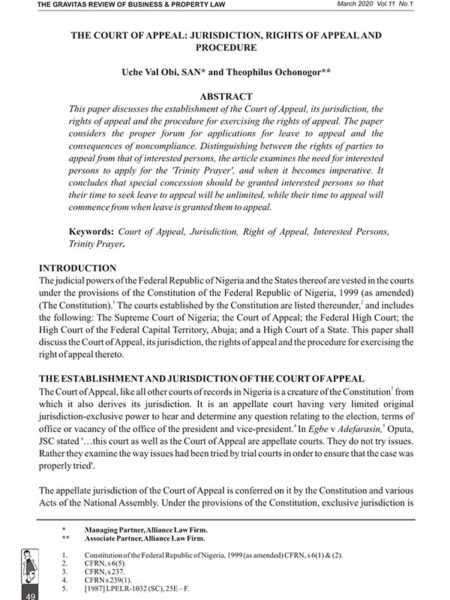
The Court of Appeal: Jurisdiction, Rights of Appeal and Procedure
0₦2,500.00Uche Val Obi, SAN and Theophilus Ochonogor of the Alliance Law Firm in their article, The Court of Appeal: Jurisdiction, Rights of Appeal and Procedure, examine the jurisdiction, rights of appeal and procedure of the Court of Appeal. They consider intriguing issues including appeals by interested persons, whether there is a time limit within which an applicant may seek leave to appeal as an interested party, whether an interested party is exempted from seeking the ‘trinity prayers’ and whether an applicant seeking to appeal as an interested party is to approach the trial high court or the Court of Appeal in the first instance.
The Gravitas Review of Business & Property Law



